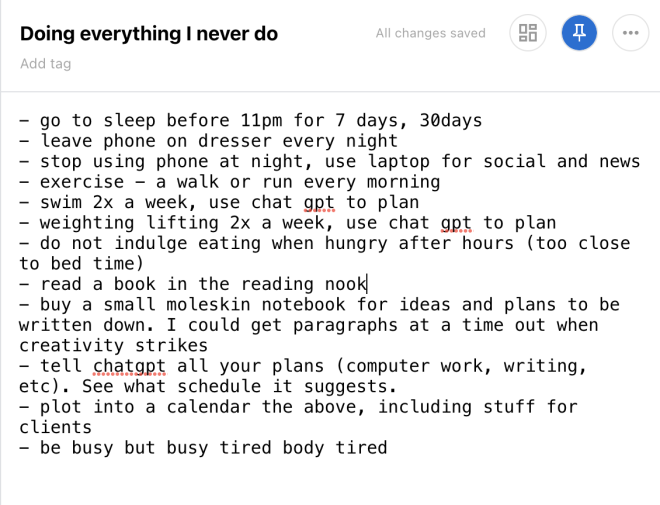Two weeks ago, I started making a never list composed of stuff I never do or rarely consider doing. This is not the same as a bucket list. I am not writing really cool things I want to do before I die. Instead, the focus of my list is around productivity and oriented in improving my quality of life.
Here’s a quick glance at my “never list”, taken from my preferred notes app, Standard Notes.

- Why is it a “never” list? Because it is a list of all the things I should probably do, but tend not to.
- Why don’t I do these things? I suspect partially from preferring to do other tasks, lack of process, and definitely pure avoidance.
Typically, I use preference to guide my actions.
This is a nice way of saying I do things that I am motivated to do. I am a highly motivated person, so I get a lot of stuff done. However, when everything you do is motivated by your preferences, that inherently means you’ll never do stuff you don’t want to do, unless you force yourself.
You also cannot be motivated to do things you don’t know about. So, if you only do stuff you want to, you miss out on what else there is to want.
For example, I might not appreciate how nice it is to take morning walks if I never do them. I don’t get to experience the benefits they bring. If I don’t engage with morning walks long enough to realize how much I like them, I will never yearn for them. The secret is to do something long enough that you realize you like it. Then you can use this preference trick to keep it up.
A lack of process means I don’t check up on the things I am not doing. So, invent a process. Write a list.
I can start by taking stock and making a check list, just like I would do for a chore or cleaning list.
For example, imagine your chores. Specifically, think of the ones you tend to do often: laundry, wash dishes, vacuum. Now imagine all the chores you don’t do or seldom do, like cleaning the fridge, removing scuff marks from walls, dusting the tops of your baseboards. You probably don’t remember when was the last time you did these. Nor do you know when you’ll do them next.
Fortunately, we can solve this problem by making a check list, with frequency in mind too, eg. weekly, monthly, semi-annually. So why not make a “never list” that can help capture the things you do not do that you should probably be doing?
Have a goal you cannot seem to meet? What if the never list can help?
When I have a goal, I tell myself good things I am doing towards it. Usually these tend to be things I am already good at or motivated to do. As an example, I have gotten an average of 7-8 hours of sleep a night for the last few years. I eat pretty healthy and avoid snacking and eating ultra processed foods. I take the stairs, park far away in parking lots, and never say no to a walk. Sounds nice, right? Wrong. (Wait till you see what I never do, below…).
I have noticed that to hit goals, I need regularity.
Now I use this template to understand the mission behind a goal: “Regulate ________ by doing regular things.”
When I plug my goals into this formula (eg. to get better sleep, improve my time management and optimize workflows, jump start my metabolism as I age), I see a pattern emerge. To accomplish them, I must use discipline. I need to do things at a regular cadence, consistently.
If I am not meeting my goal, then I am probably not doing the contributing steps regularly enough.
For example, I would like to improve my metabolic health. The contributing factors could be simplified to: get regular sleep, eat regular meals, get regular exercise. Remember when I said I was good at sleeping, eating, and exercise? Keep scrollin’…
You’d be surprised how much I don’t do things to meet this goal. And these things are definitely on my never list, now. You could say that I am actively avoiding doing the things necessary to achieve the goal, especially by telling myself how great I am doing otherwise.
Instead of a consistent schedule that metabolic health requires, irregularity is my theme:
- Inconsistent sleep times, several hour span (eg. 12am – 3am)
- Sporadic wake up times, several hour span (8am – 10am)
- Eat at unpredictable times, and often eat dinner late at night, just hours before bed time should be
- Watch TV or stare at my phone screen up to the minute of sleep
- Exercise – If I dared to track this, I would see that I lead a sedentary life. 😬
One of the top things from my never list is to finally go to bed before 11pm the majority of my days.
I am not the only one who wants to change their sleep schedule. Another Small Web blogger, Manu, wrote on his recent post, “Mismatch”:
I am a morning person. I know it. I experimented with it and I know for a fact that I’m happier, more productive and live a better life when I wake up early. Not once, when up early, I thought “Why am I already awake? Shouldn’t I be sleeping?”. That’s just not a thought I have because I know how much more I enjoy life when I’m up early. But late at night? That’s a constant thought. I’m sitting there, reading something online and I constantly think “Why am I here reading this? I should be sleeping”. And in doing that, in staying up late, the mismatch gathers strength. It’s a vicious cycle.
Clearly, waking up early is something he wants to do. That means going to bed early. He’s not doing that. He’s staying up wondering why he is staying up. Oh, how I can relate! The never list was never needed more (haha!).
Not doing things we wish we were doing affects us deeply.
On a more serious note, not being able to achieve our goals, or “idealized” state of being because of inaction is difficult to cope with.
Referring to Manu’s post again,
And it’s not much the fact that I am not the person I’d love to be—or that I think I am—but the fact that I don’t do the things that I should be doing in order to become that person. And it fucking sucks.
Do you have goals you’re not meeting? Think the never list might be worth a try? Tell me about it by writing with me!
Instead of traditional comments, I encourage you to respond with blog posts, videos, or other digital creations on your own space (read why here).
👉 Share your response by posting a url to contribute to the evolving conversation section, which also includes prompts to inspire you.
What am I doing on the never list? What is working?
Since I started this list two weeks ago, I have successfully gone to bed before 11pm about 4 days. But! I have gone to bed before 12am probably most of these days. I went for morning walks, I tried being more aware of eating late at night, I stopped using my phone in bed (mostly), and I am taking down frequent notes (not in a moleskin, though).
What’s not helpful is trying to treat the never list like a numbers game.
It does not matter how many items on the list you do or how many times you do it. The never list is going to be hard, so coming up with metrics like it’s a normal check list isn’t going to work.
Instead, the most interesting outcome of the never list is observing how I’ve actually used it. I’ve allowed myself to be flexible. Particularly I’ve observed how I prioritized certain items more than others and how I altered some of the “solutions” I initially jotted down. I am also making peace with what is not being attempted, yet (like really rigid exercise regimens).
👇 Breakdown of the list:
- Health Oriented – 🟢 Status: Actively trying
- “go to sleep before 11pm for 7 days, 30days”
- “exercise – a walk or run every morning”
- “do not indulge eating when hungry after hours (too close to bedtime)”
- “be busy…but busy-tired plus body-tired” – Instead of being only mentally tired, be physically tired by moving more. You fall asleep faster. You appreciate bed time so much more when you’re physically exhausted. I think these tired “types” need to match.
- Screen Time Limitations – 💡 Status: Altered Solution
- “leave phone on dresser every night” – failed, but pivoted to another idea…
- “stop using phone at night” – I now use it for meditation music on youtube. Harder to be “on my phone” when it’s being used for something else
- Productivity & Creativity – 💡 Status: Altered Solution
- “buy a small moleskin notebook for ideas and plans to be written down. I could get paragraphs at a time out when creativity strikes”
As an alternate solution, I started using my Standard Notes app with a new note called “Thinking”. Psychologically, I suppose calling it that gave me the freedom to write a stream of consciousness into it. This app works great on my phone or laptop, and it’s much faster than Notion (which takes forever to load on my phone). I need it to be speedy so I can capture ideas on the go.
This is the most consistent implementation from my never list. Nearly daily, I’ve filled up this note with lots of useful bits. It has paid dividends, as it has encouraged or facilitated better note-taking across the board. I have moved some notes to more appropriate places, remembered to reach out to people, or simply gotten content flowing out of me and onto this site.
- “buy a small moleskin notebook for ideas and plans to be written down. I could get paragraphs at a time out when creativity strikes”
What’s missing from this list? What did I not even attempt to do?
Not even attempted are the rigid exercise ideas, usage of ChatGPT to run my calendar, and book reading in the nook (but technically I finished a book, Platform: The Art & Science of Personal Branding, recently – written by a former colleague and leading brand expert, Cynthia Johnson).
What went wrong, I think, was trying to provide solutions while also identifying what I am not doing. It was a bit ambitious. Ultimately, I needed the flexibility to think about why I don’t do things.
Getting to a frictionless solution was better than clinging to the original one. Also, analyze success with both short and long term observations. What becomes a habit?
In the short term, the biggest impact to my life the last two weeks was probably the “Thinking” notes, and I did not need to buy a pen or a moleskin notebook to do it.
In the long term, I suspect getting my metabolic health in order with regular routines around diet, exercise, and sleep will win. This is probably a life long pursuit. However, I strive to make it drop off my “never list” and become embedded into my routine.
Going forward, I plan to update my never list every 3-6 months. I think I should give myself a lot of time to get through this list and get these things to stick, before taking on more.


